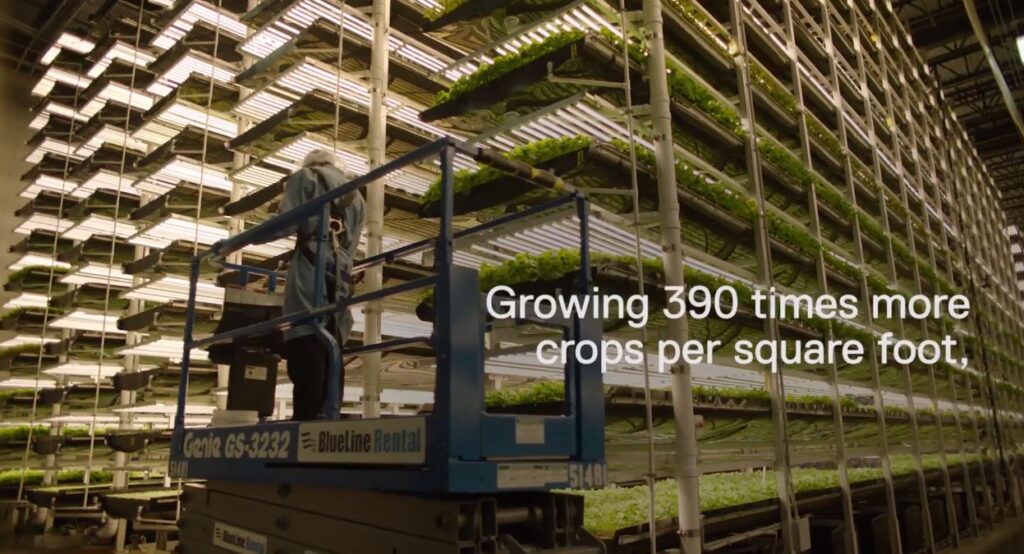by James A. Bacon
Newark, N.J.-based AeroFarms will invest $42 million to build its largest, most sophisticated indoor vertical farm to date in a joint Danville-Pittsylvania County industrial park. The project will create 92 new jobs.
Virginia competed with North Carolina for the project. Subsidies include a $200,000 grant from the Commonwealth’s Opportunity Fund, a $200,000 grant from the Governor’s Agriculture and Forestry Industries Development Fund, $190,000 from the Tobacco Regional Opportunity Fund, and an unquantified tax benefit from locating in a Virginia Enterprise Zone.
Aerofarm’s business model is incredibly cool. The company uses proprietary aeroponic growing technology to “produce highly flavorful leafy greens at at rate 390 times more productive than field-grown plants,” states a press release from the Governor’s Office. The farming techniques use a fraction of the water and fertilizer of traditional agriculture.
The company grows 750 different crops in industrial buildings, using sensors and data to make precise adjustments to micronutrients, temperature, airflow and light — elements that farmers have little control over in their fields — to optimize plant growth. “We adjust the fertilizers, we’ll track magnesium, iron, zinc and all the minerals and elements,” CEO David Rosenburg explained at Fortune magazine Global Sustainability Forum in September.
“When you can really play with those environmental factors and all these tools in a big data way in a farm the size of [a] building, it really becomes illuminating of how plants react in different ways.”
That could be game changing for food as we know it, Rosenberg explained. “There are ways you can influence taste, nutritional density, shelf life, color, all these factors. Typically farmers are just hoping for yield, but there’s a lot more to celebrate—not just diversity, but quality.”
The AeroFarms deal follows an announcement in June that Shenandoah Growers was investing $100 million in three indoor-agriculture facilities. Billing itself as a “next-generation indoor bio-farm,” Shenandoah Growers specializes in cultivating herbs such as basil, mint, cilantro, parsley, rosemary, thyme and oregano. (There was no mention in this Harrisonburg Daily News-Record article of the company receiving any state grants, subsidies or tax breaks.)
Bacon’s bottom line: Indoor farming is attracting serious capital because it offers significant advantages. The upfront cost of building industrial-scale structures is offset by using a tiny fraction of the land and consuming far less water and fertilizer. Thanks to the ability to utilize data to make precision adjustments, indoor farming is phenomenally productive. If the concept takes off, we could see indoor farms replace convention farming wholesale for a wide variety of crops — especially leafy greens and herbs. Indoor farming is being used to cultivate strawberries, and I can hardly wait for the practice to spread to blueberries as well. It seems unlikely that indoor farming can ever displace mass-volume crops such corn, wheat and soybeans — but, who knows?
The implications are fascinating to explore. The economy is undergoing a weird inversion. With indoor farming, we’re seeing agricultural production move to industrial parks and other factory settings. And with solar farms, we’re seeing energy production shift from industrial sites to what once were land-intensive agricultural settings.
It will be interesting to see how Virginia Tech, which has defined “precision farming” as the future of agriculture, responds to the trend. Future Farming describes Tech’s SmartFarm Innovation Network:
On the farm of the future, drones will fly over forests and crops to communicate with robots embedded in harvesting equipment on the ground. Sensors on livestock and in field crops and forest lands will be linked to the cloud where big data is transformed into practical information regarding precision feeding, protection, and management decisions. Plants will be biodesigned to require less water and fertilizer, and be tolerant to drought, pests, and floods while producing more food. Farmers will operate their businesses with iPads as much as tractors.
Sounds similar to the thinking behind AeroFarms — with one big difference. Virginia Tech seems focused on helping traditional, land-intensive, outdoor agriculture make the transition to smart farming. That may make sense for corn, wheat and soybeans. Whether smaller Virginia farms can compete with the giant mechanized farms in the Midwest, which no doubt are embracing smart-farm concepts as well, remains an open question.
One thing for sure: There are no limits to human ingenuity. American “farmers” are adopting practices that will allow them to conserve resources and still feed the world.



